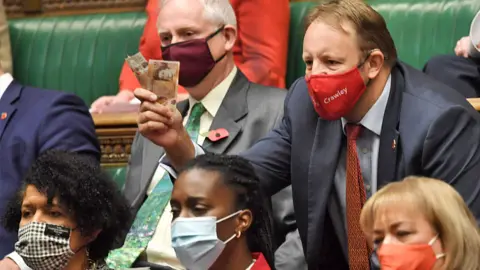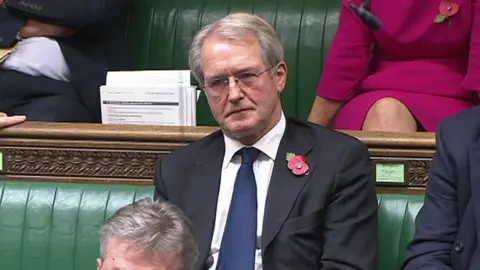Owen Paterson: Government faces backlash over new conduct rules plan
The government is facing a furious backlash after it voted to change rules on the way MPs' conduct is policed - blocking the suspension of one of its own former ministers.
Owen Paterson was found to have broken lobbying rules, but said he was not given the chance to clear his name.
His Tory allies called for a shake-up of the standards watchdog and won the vote thanks to government backing.
But Labour said the government was "wallowing in sleaze".
All opposition parties have refused to take part in any new standards system the government sets up.
Labour also accused Business Secretary Kwasi Kwarteng of trying to "bully" the standards commissioner, Kathryn Stone, out of her job.
He told Sky News it was "difficult to see what the future of the commissioner" was and it was up to her to "consider [her] position".
Shadow leader of the House, Thangam Debbonaire, said the prime minister "must immediately distance himself from these latest attempts to poison British politics", adding: "All decent people of all political beliefs must stand against these naked attempts by Tory MPs to avoid scrutiny of their behaviour."
The office of the commissioner who oversees the process said Ms Stone would not be resigning.
Writing in the Guardian, Labour leader Sir Keir Starmer said Tory MPs had voted "to let off one of their own".
The chair of the Commons Standards Committee, Labour's Chris Bryant, also compared the action to what would happen in Russia.
But Mr Kwarteng defended the government and his party, saying they were "completely focused on trying to restore a degree of integrity and probity in public life".
The committee - made up of MPs from all sides and lay members - had recommended that Mr Paterson be banned for 30 sitting days after being found to have misused his position as an MP to benefit two firms he worked for.
A suspension of this length could have seen the Tory MP then face a recall petition, which could lead to a by-election for his seat.
The committee's recommendations have to be signed off by MPs in the Commons.
Such recommendations are usually accepted without much discussion - but on Wednesday, the government ordered its MPs to vote for an amendment to halt Mr Paterson's case and to rejig the standards system.
Labour, the SNP and Lib Dems voted against the plans, along with 13 Conservative MPs, while dozens of Tories abstained.
But it was carried by 18 votes after a heated Commons debate, to cries of "shame" from the opposition benches.
 UK Parliament
UK ParliamentSir Keir said the move by the Conservatives would "further undermine public faith in politics at a time when we should be trying to restore decency and honesty".
But he said it was "no surprise" the Tories were "yet again wallowing in sleaze", adding - in a reference to Prime Minister Boris Johnson - that "the rot starts at the top".
The SNP's Pete Wishart also called it a "shameful episode" and "yet another example of Tory stitch-ups and sleaze".
And crossbench peer Lord Evans, who chairs the Committee on Standards in Public Life - advising the PM over the conduct of his ministers - said it was "a very serious and damaging moment for parliament and for public standards in this country".
Mr Bryant told BBC Radio 4's Today programme that the government had "created a rod for their own back" by trying to overhaul the system without cross-party agreement.
"At the end of the day, some people decided - and this is the very definition of injustice - they decided at the very last minute, for a named individual, they would change the rules," he said.
"That is not what we do in this country. That is what they do in Russia."
But Business Secretary Mr Kwarteng rejected those comparisons, telling Today that MPs had been talking about changing the process "for a long time".
He said the vote was about "bringing back a sense of fairness", and Mr Paterson's case "heightened and brought attention to this fact".
He added: "The House yesterday (Wednesday) decided to do something about it and overhaul the system."

What did Owen Paterson do?
 House of Commons
House of CommonsMr Paterson has been a paid consultant for clinical diagnostics company Randox since 2015 and to meat distributer Lynn's Country Foods since 2016.
MPs are allowed to have these jobs, but are not allowed to be paid advocates - using their influence in Whitehall for the company's gain.
The committee concluded that Mr Paterson had breached this rule on paid advocacy by:
- Making three approaches to the Food Standards Agency relating to Randox and the testing of antibiotics in milk
- Making seven approaches to the Food Standards Agency relating to Lynn's Country Foods
- Making four approaches to Ministers at the Department for International Development relating to Randox and blood testing technology
Mr Paterson was also found to have broken conduct rules by:
- Failing to declare his interest as a paid consultant to Lynn's Country Foods in four emails to officials at the Food Standards Agency
- Using his parliamentary office on 26 occasions for business meetings with his clients
- And in sending two letters relating to his business interests, on House of Commons headed notepaper

The committee's recommendation that Mr Paterson be suspended from the Commons followed a damning report into his conduct by the Parliamentary Standards Commissioner Ms Stone.
It described the MP's actions as "an egregious case of paid advocacy".
But Mr Paterson rejected the findings, claiming he had been pronounced guilty "without being spoken to" and that "no proper investigation was undertaken".
He also claimed the investigation had been "a major contributory factor" in the death of his wife, Rose, who took her own life last year.
In a statement after the vote, he said: "After two years of hell, I now have the opportunity to clear my name."
Tory MP Angela Richardson was sacked as a ministerial aide following her decision to abstain on the crucial vote.
